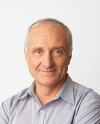Robyn Williams

Robyn Williams has presented The Science Show on ABC Radio National since 1975. His last book was Future Perfect (2007) and, before that, Unintelligent Design (2006). He is a visiting professor at several universities.
In 1972, at the start of my career as a science journalist, I was asked to produce the Commonwealth Day documentary, a portrait of the spectacular Anglo Australian Telescope being built on Siding Spring Mountain. Together with the Australian National University, an independent board was driving the telescope project. I set off to Canberra to interview the infamous Olin Eggen, then director of Moun ... (read more)
There are three ways to read this delightful book. The first – your reviewer’s method – is to romp through it picking places to linger and relish. The second way is to take a few months off and study every page, taking notes. Students and specialists will do this and be rewarded. The third way is to have it handy on the shelf to return to when a topic turns up needing clarification.
James F ... (read more)
Fred Watson’s inspiration as a lad was the legendary telly astronomer Patrick Moore, who presented the BBC’s show The Sky At Night for more than fifty years. At the end, when others such as Chris Lintott began taking over, Moore was simply wheeled in at the start of the show in his wheelchair, to mumble a couple of sentences, then wheeled off again, out of the way, looking on wistfully.
Watso ... (read more)
Peter Atkins writes a sentence at the beginning of this bewildering book that seems both preposterous and cheeky: ‘I would like to assert that not much happened at the Creation.’ And then: ‘I would like to replace the “not much” by “absolutely nothing”.’ How can any leading scientist, and Atkins is certainly that, claim that the very beginning of the universe and everything could h ... (read more)
What shocks me, as I consider this important new book, is how completely John Bolton has disappeared from the public mind. Just consider, he pioneered extragalactic radio astronomy, built two superb radio telescopes, was worthy of a Nobel Prize, hired or mentored a generation of top scientists – and was played by Sam Neill in the film The Dish (2000). Neill’s character was not called Bolton in ... (read more)
I must let you into a secret. I have three different ways of reading books: lightning fast, with serene attention; and, as with Smashing Physics, postmodern.
The fast mode is forced by unavoidable professional requirements. This week, for example, I received a (thankfully) slim volume just hours before having to record a satellite interview with the author who is based at Harvard. I had ninety mi ... (read more)
Are you a romantic or a killjoy? This question is the essence of Thomas Suddendorf’s terrific book. I have been both. Ten years ago I wrote a novel in which the world’s creatures got fed up with our human neglect of the planet and, in one turbulent day, took over civilisation. A couple of border collies ran Europe and did far better than the suits in Brussels.
... (read more)
I’ve interviewed Stephen Hawking twice. On both occasions it was in his old office in Silver Street, Cambridge – in front of his huge poster of Marilyn Monroe. The first time, in 1989, I was a little anxious, not because I was with the world’s best-known scientist, but because I found the awkward silences waiting for his answers hard to manage. What do you do, having asked a question, during ... (read more)
Did you know that the Great Wall of China cannot be seen from space; or that Arabic numbers (1, 2, 3) came from India; or that Descartes thought up letters (a, b, c, and x) for use in algebra; or that William Bateson coined the word ‘genetics’? Did you know that there are five million trillion trillion bacteria on earth – give or take a few?Every few pages William Bynum gives you a choice fa ... (read more)
